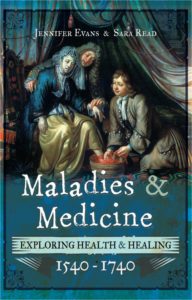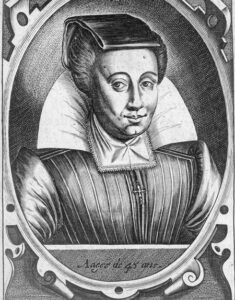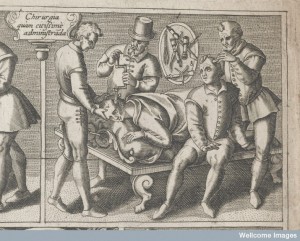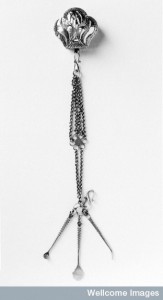In keeping with the news of the birth of the new heir to the throne (or jumping on the bandwagon depending on how you view things) today’s post is just a very brief look at what the midwife Jane Sharp recommended for the post-post-partum care of new mothers. If you would like to know what she, and others, said about the process of giving birth have a look at this post on Early Modern World: http://myearlymodernworld.blogspot.co.uk/2013/07/birth-babies-and-midwives.html
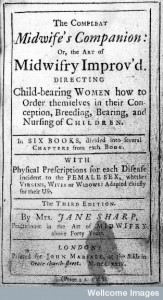 As Elaine Hobby has explained, midwifery manuals at this time were usually translations of European treatises, which were in turn drawn from the works of Galen, Aristotle and Hippocrates. They contained information on what made a good midwife, instructions for ante-natal care, as well as information on difficult births and post-natal diseases and ailments. They were mostly written by men, such as The Compleat Midwifes Practice (1656) attributed to T. C., I. D., M. S., T.B.1
As Elaine Hobby has explained, midwifery manuals at this time were usually translations of European treatises, which were in turn drawn from the works of Galen, Aristotle and Hippocrates. They contained information on what made a good midwife, instructions for ante-natal care, as well as information on difficult births and post-natal diseases and ailments. They were mostly written by men, such as The Compleat Midwifes Practice (1656) attributed to T. C., I. D., M. S., T.B.1
Sharp’s treatise The Midwives Book (1671) was heavily dependent on the works of radical Nicholas Culpeper, who admitted in his own midwifery manual that he had never attended a birth.2 Nonetheless, Sharp’s treatise was notably different, it was the first English midwifery manual written by a female practising midwife. Translations and works based on the treatise of French midwife Louis Bourgeois were also available. It was the first addressed to midwives as ‘sisters’ and that treated midwives as not inherently ignorant.3
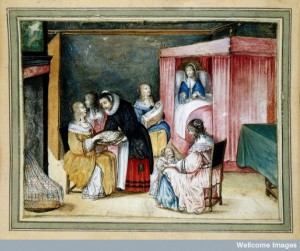
So what did Sharp recommend for the care of women who had just given birth? In the second ‘book’ of her treatise she wrote:
What must be done after the woman is delivered.
‘IT will be profitable when a woman hath had sore travel, to wrap her back with a sheep-skin newly flead off, and let her ly in it, and to lay a Hare-skin, rub’d over with Hares blood newly prepared, to her belly; let these things be worn two hours in winter, and but one hour in Summer, for these will close up the parts too much dilated by the childs birth, and will expel all ill melancholly blood from those parts.
This being done, swathe the woman with a Napkin about nine inches broad, but annoint her belly with Oyl of St.Johns wort, and then raise up the womb with a linnen cloth many times folded, cover her flanks, with a little pillow about a quarter of a Yard long, then swathe her, beginning a little a|above the hanches, rather higher than lower, winding it even; lay warm cloths to her breasts, forbearing those that repulse the milk till longer time, and the body be setled, lest repercussives should do her hurt, let then her blood be first setled ten or twelve hours, and that the blood which was cast upon the lungs by violent labour may return to its own place; but you may ease the pains of her breasts and comfort them, laying a linnen cloth doubled and not warm’d, dipt in Oil of St. Johns wort and of Roses, with the yolk and white of an egg beat together, of each an ounce, with an ounce of Rose-water, and as much of Plantan-water. Let her not sleep till about four hours after she is delivered, but first give her some nourishing broth or Cawdle to com|fort her; let her eat no flesh till two dayes at least be over, for she may not use a full diet after so great loss of blood suddenly, as she grows stronger she may begin with meats of easie digestion, as Chickens, or Pullets; she may drink small wines with a little Saffron, Mace and Cloves infused, equal parts, all tied in a piece of linnen, and let them lie in the wine so close stopt, she may drink a small draught of it at dinner and supper for the whole month, and besides her ordinary food she may if she will take nourishing broths and Aleberries; with bread, butter, and Sugar. Let her drink her Beer or Ale with a tost, she may drink a decoction of Liquorish, Raisins of the Sun and a little Cinnamon: if the child be a boy she must lye in thirty dayes, if a girl forty daies, and remember that it is the time of her purification that her husband must abstain from her. 4
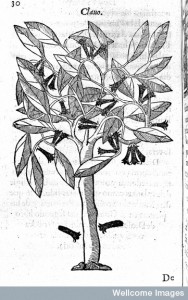
Sharp’s recommendations aimed to ease the pain of the body that had been through labour, reduce the dilation of the woman’s reproductive system, restore and nourish the woman with broths, meats and warming spices, and return any blood that had become misplaced during the exertions of labour back into its proper place. Lastly Sharp reminded husbands and wives that they were not to have sex until after 30 or 40 days.
I can’t see any new mother now wrapping herself in hare’s skin rubbed with blood, or drinking beer, ale or wine immediately after giving birth, but maybe a nourishing broth or a chicken dinner might be on the menu.
________________
1. Elaine Hobby (ed.), The Midwives Book (Oxford, 1999), xvi
2. Ibid, xxii
3. Ibid, xxiii
4. Jane Sharp, The Midwives Book: Or the Whole Art of Midwifery Discovered (London, 1671), 210-12.
© Copyright Jennifer Evans, all rights reserved.
